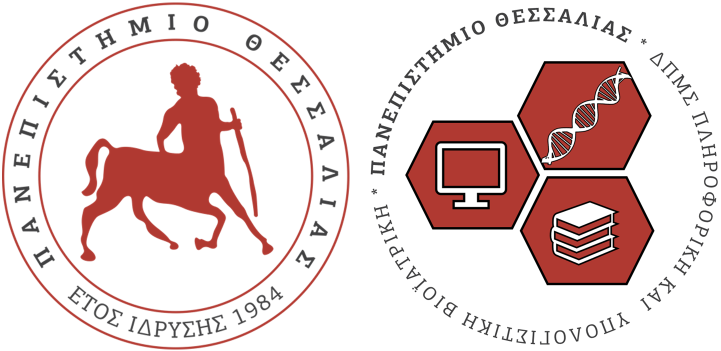The venue of the courses and examinations of the MSc Programme “Informatics and Computational Biomedicine” is defined to be the existing logistical infrastructure (classrooms and educational or training facilities). research laboratories) of the Department of Informatics with Applications in Biomedicine and the Department of Informatics and Telecommunications, which are housed in the building of the old Academy in Lamia, which is located in the area of Galaneika in the street Papasiopoulou 2-4.
Detailed Information:
· The winter semester starts in the first half of October. The start and end dates of the postgraduate courses of the spring semester are the same as in the undergraduate programme of the Department.
· For each course, one teacher is appointed as Coordinator. His/her responsibility will be to coordinate the syllabus, deliveries, assignments and seminars, in order to reduce the amount of overlap of the syllabus and maximise the expected results from the teaching of the course. The coordinator will be the faculty member who teaches the largest percentage of the course, while in the case of courses taught to a greater extent by external lecturers, the decision will be taken by the Programme Committee on the recommendation of the relevant Coordination Committee.
· The credits (ECTS) of each course reflect the total workload, i.e. the time it is estimated that a student needs to spend on average to successfully complete all the planned educational procedures and achieve the learning outcomes of the postgraduate programme of study, such as attending lectures, tutorials or workshops, participating in seminars, independent private study, preparation of assignments, practical training, participation in examinations, writing a thesis or dissertation, or writing a dissertation or dissertation.
· The timetable is drawn up before the beginning of each semester, at the same time as the selection of teachers. Each semester of study lasts at least twelve (12) full weeks.
· The physical participation of graduate students is required for all courses. In this case, the lecturer is obliged to take attendance at each lecture and attendance lists are submitted to the Secretariat. A number of absences in a course greater than or equal to 25% of the number of lectures will result in a zero in the corresponding course, and the student will be required to repeat or substitute the course. In the case of courses delivered at a distance via the Internet, monitoring of attendance must also be ensured by specific methods offered by the relevant programmes.
· The way of grading each course is decided by the instructor and communicated to the students in the first week of class. The criteria may include written or oral examinations, presentations of papers, or any other method deemed appropriate by the teacher. In cases of co-teaching, the grades of the different teachers will be counted according to their teaching percentage. The final responsibility for the scoring lies with the Coordinator.
If a postgraduate student fails a course, he or she may be re-examined in that course in the September re-examination period.
- PAPASIOPOULOU 2-4, LAMIA
-
Secretariat of the MSc Programme: 3rdklm. P.Ε.Ο. Lamia - Athens, 35100, Lamia,
Tel: 22310 – 60225 60226 - icb [at] dib.uth.gr


